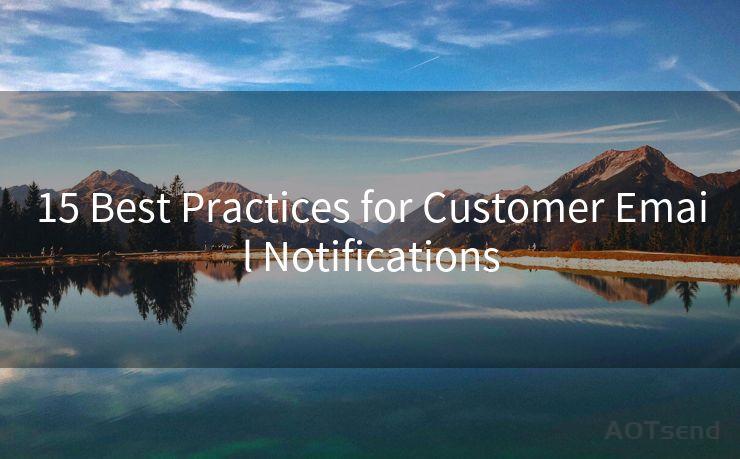15 Best Practices for Customer Email Notifications




In the digital age, email notifications have become a crucial part of the customer experience. Whether it's a welcome message, an order confirmation, or a shipping update, these emails keep customers informed and engaged. Here are 15 best practices for crafting effective customer email notifications that enhance the user experience and drive conversions.
1. Clear and Concise Subject Lines
The subject line is the first thing recipients see, so it's essential to make it clear, concise, and relevant. Avoid clickbait or misleading titles; instead, opt for straightforward language that accurately reflects the email's content.
2. Personalization
Using the recipient's name in the greeting adds a personal touch. Moreover, tailoring content based on user preferences or past interactions can significantly improve engagement.
3. Responsive Design
Ensure your emails are mobile-friendly. With the majority of emails being opened on mobile devices, a responsive design is crucial for a seamless user experience.
4. Relevant Content
Every email should serve a purpose. Whether it's a promotional offer, a transaction update, or a customer survey, the content should be relevant and valuable to the recipient.
5. Call to Action (CTA)
Include a clear and compelling CTA in every email. Whether it's a button or a link, make sure it's prominent and easy to find.
6. Unsubscribe Option
Always provide an unsubscribe link to comply with email marketing regulations and respect user privacy.
7. Timely Delivery
Send emails at the right time. For example, order confirmations should be sent immediately after purchase, while marketing emails might be better received during business hours.
8. A/B Testing
Regularly test different elements of your emails, such as subject lines, CTAs, or email body content, to see what works best with your audience.
9. Brand Consistency
Maintain brand consistency in your emails by using your company's logo, color scheme, and tone of voice.
10. Plain Text Alternative
Provide a plain text version of your email for users who prefer or require it.
11. Segmentation
Segment your email list based on user behavior, demographics, or other criteria to send more targeted and relevant messages.
12. Avoid Spam Filters
Familiarize yourself with common spam trigger words and avoid using them in your emails to prevent them from being marked as spam.
13. Tracking and Analytics
Utilize tracking tools to monitor email open rates, click-through rates, and conversions to optimize future campaigns.
14. Feedback Loop
Encourage recipients to provide feedback on your emails. This helps you understand what's working and what needs improvement.
15. Regular Audit
Regularly audit your email notification system to ensure all processes are running smoothly and efficiently.
By following these 15 best practices for customer email notifications, you can not only improve customer engagement but also build trust and loyalty with your brand. Remember, every email you send is a reflection of your brand, so make sure it's a positive one!

🔔🔔🔔
【AOTsend Email API】:AOTsend is a Managed Email Service for sending transactional emails. Support Email Types: reminders, authentication, confirmations, notifications, verification codes, invoices, password resets, account activations, billing statements, two-factor authentication (2FA), and one-time passwords (OTP) emails, etc. $0.28 per 1000 Emails. 99% Delivery, 98% Inbox Rate.
You might be interested in:
Why did we start the AOTsend project, Brand Story?
What is a Managed Email API, How it Works?
Best 25+ Email Marketing Platforms (Authority,Keywords&Traffic Comparison)
Best 24+ Email Marketing Service (Price, Pros&Cons Comparison)
Email APIs vs SMTP: How they Works, Any Difference?




Scan the QR code to access on your mobile device.
Copyright notice: This article is published by AotSend. Reproduction requires attribution.
Article Link:https://www.mailwot.com/p5348.html



